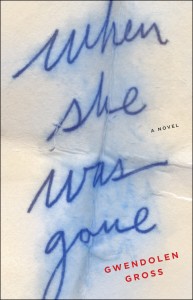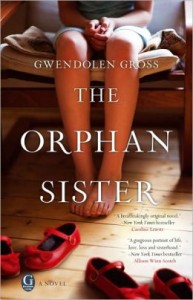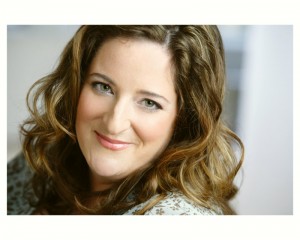One of the best things about friendships with other writers is getting to celebrate their successes. My dear friend and a terrific novelist, Gwendolen Gross recently published another novel (her fifth!) and I’ve been wearing my party hat ever since. I’m delighted that she agreed to do a Q&A session for my blog.
When She Was Gone is a novel about what happens in a community when a young college-bound girl disappears. It’s told in multiple points of view, with the addresses of the neighbors as chapter headings, which makes the community a characters as well as the various individuals–the girl’s mother, her neighbors, her ex-boyfriend and a curious eleven-year-old boy.
JR: First, I want to say how much I love this novel. The first chapter draws the reader in with beautifully crafted details and revelation after revelation of the characters and the situation. Where did the idea for the book come from?
 Gwendolen Gross: Thank you! I had hoped, from the very beginning, to write about the hole that someone leaves when they disappear, rather than writing about the disappearance itself, exactly. I also am fascinated by the idea that we all look out of our windows at the street, but we have our lives, our secrets, our slightly different perspective and very different narrative that goes with the view. Character often dictates point of view for me–I decide how close I need to be, and how much fish-eye lens I need to see the character the way I want to see. Writing is all about those lenses, and it’s amazing how you can explore the same subject given different points of view. Often in my workshop, I’ll have students write a paragraph in first person (if I want it to be really complex, I’m make them write about a liar), and then the same paragraph but in third person, or even second, changing lenses.
Gwendolen Gross: Thank you! I had hoped, from the very beginning, to write about the hole that someone leaves when they disappear, rather than writing about the disappearance itself, exactly. I also am fascinated by the idea that we all look out of our windows at the street, but we have our lives, our secrets, our slightly different perspective and very different narrative that goes with the view. Character often dictates point of view for me–I decide how close I need to be, and how much fish-eye lens I need to see the character the way I want to see. Writing is all about those lenses, and it’s amazing how you can explore the same subject given different points of view. Often in my workshop, I’ll have students write a paragraph in first person (if I want it to be really complex, I’m make them write about a liar), and then the same paragraph but in third person, or even second, changing lenses.
JR It seems everyone in the book has a secret (I won’t give any of them away). What is it about secrets that drew you to write about them?
GG Aren’t secrets everything? They motivate all sorts of strange behavior. I live in a lovely suburban town, and occasionally the police blotter will reveal some absurd and complex narrative about an affair, a murder plot, a theft, something that can only be explained by the holes in people’s hearts and the lies they tell to circumnavigate secrets. Honestly, in real life, I steer as clear as I can from gossip. In fiction, I can explore how it influences truth.
JR All your characters seem to have some particular quirkiness–I was particularly drawn to Mr. Leonard, the retired piano teacher, and George, the young boy who is so creative and smart. Briefly, how do you develop your characters? Do they surprise you as you write? Do they come to you in dreams? We writers want to know.
GG I think I am all of them, just a little bit. I think we all are, even though I’m amazed when people say they most sympathize with Reeva, the queen-bee-cheater (I’m not her, except perhaps in a tiny way you’ll never guess, a completely tertiary way that has nothing to do with her faults, of course). But character is the whole world, isn’t it? Character is what we live with. I adore Mr. Leonard and George–they were my favorite characters. I wrote much more about them then ended up in the book, but I never intended to make them more than they are–keystones in the arch of the narrative. A wanted to tell a mystery, but tell it slant. Do you all dream your characters? I don’t dream about them, but sometimes in my dreams I am my characters.
JR My characters sometimes come to me in dreams, especially Louise, the protagonist of my current in-progress novel. I think she’s anxious for me to finish her story. Your writing is so rich in sensory details, too. Where do you find them? What can you tell writers who have difficulty finding fresh sensory details.
GG Feeling is first for me. In fact, editing is a lot of reining in the sensory to simplify the story. What I want as a reader is to live in the author’s world, to feel with her, to smell what the character smells (except, of course, when it’s dog farts), to taste and touch and then to feel in inevitable losses and loves. This summer I’m taking my writing workshop outside on a series of getting out to write workshops—I used to do this a lot on my own. I think we all have our natural strengths as writers—perhaps yours is dialogue? I’ve had to work on that quite a bit (by eavesdropping—I never said it wasn’t fun work). But the sensory comes naturally to me. I have a hyperactive sense of smell and sound. When I was pregnant with my son, I heard a neighbor’s smoke alarm two doors down in the middle of the night. It was only beeping plaintively, and needed a new battery, but it sounded to my pregnant mind like emergency.
Here’s some advice: make practice lists of 10 smells (this can be hard to do with any originality—notice that many smells are actually metaphors), of 10 tastes (and they don’t have to be delicious), of 10 textures, etc. Then make a list of 50 verbs. While all that seems like a lot of listing, it makes you collect your colors, like a painter preparing to mix on a palette. When you revise, make a pass just for sounds—did you write “a loud sound” when you could have written “clanging;” did you write “smelled awful,” when you could have written “smelled of mildewed towels and anxiety sweat?” And surely make a pass for strong verbs. Strong verbs are at the core of description, and we often forget to tear into them, to rasp our way past the ordinary walking and saunter on to gamboling by.
JR How much of your own life and interests do you include in your fiction? I’m thinking particularly of music in When She Was Gone, all the beautiful music you give Mr. Leonard.
GG My first few books were the most autobiographical, but I find myself putting my passions into my books whether I’d intended to or not. When my friend Cindy read When She Was Gone, we’d been talking about how I was taking a year off my from chorus, and she said, “I read it. You got to sing anyway!” There are things you put in your writing on purpose, and things that are just your language, intentional or simply instinctual. What are your passions? How do they thread themselves into your work?
JR I’ve made my protagonist a singer, not because I love singing (though I do) but, because I can’t carry a tune in a peach basket and I wanted to experience success at it at some level. Should we expect something about horses in your next book?
GG I’m trying. It’s my daughter’s heartfelt wish. At this point my composer protagonist is trying to understand how her husband and daughter have gone so horse-crazy, but I can’t say whether that will stay. Some days I just want to be a horse.
 JR Over the years you’ve been writing novels — Field Guide was published in 2001, Getting Out in 2002, The Other Mother in 2007 and The Orphan Sister in 2011— what are the three most important things you’ve learned about writing fiction, particularly novels?
JR Over the years you’ve been writing novels — Field Guide was published in 2001, Getting Out in 2002, The Other Mother in 2007 and The Orphan Sister in 2011— what are the three most important things you’ve learned about writing fiction, particularly novels?
GG Oh, I love this. Three.
•Fall in love with revision. If you’re afraid of molding your clay, it’ll get dry, and it will crack.
•Sometimes you need to dig in the dirt to make new clay.
•Sometimes you need distance to see clearly. Everything is smaller from a distance, more containable. You can put it in a frame, and then start exploring what you see, start controlling your material, making it yours. It’s easier to tell the truth with fiction (at least for me) than it is when you’re bogged down in the quotidian swamp of the factual but-this-is-how-it-really-was.
JR Anything else you’d like to tell readers and writers who might read this post?
GG Sometimes writing is love, and sometimes love hurts. Sometimes you need a vacation from your writing, but the only way to see through to the next draft is to write the first one, not to talk about it, not to stop part way and rethink it (not that I’ve never done that), but to write one, word after word.
JR Congratulations on a beautiful novel, Gwendolen. Your writing is so beautiful; I use it as both teacher and inspiration.
 Gwendolen Gross is the author of five novels. She’s a graduate of Oberlin College, has an MFA from Sarah Lawrence College, and was a PEN West Emerging Writers Fellow. She is also an award-winning writing instructor and has led workshops at Sarah Lawrence College and the UCLA Extension online. Her guest lectures include appearances at the Fashion Institute of Technology, at Barnes and Noble’s Educator’s Night, and The World’s Largest Writing Workshop. She lives with her family in New Jersey. Visit her on the web at: Gwendolengross.com.
Gwendolen Gross is the author of five novels. She’s a graduate of Oberlin College, has an MFA from Sarah Lawrence College, and was a PEN West Emerging Writers Fellow. She is also an award-winning writing instructor and has led workshops at Sarah Lawrence College and the UCLA Extension online. Her guest lectures include appearances at the Fashion Institute of Technology, at Barnes and Noble’s Educator’s Night, and The World’s Largest Writing Workshop. She lives with her family in New Jersey. Visit her on the web at: Gwendolengross.com.

Inspirational interview Judy. I am motivated to get back to the 4th rewrite of my novel in progress that I distanced myself from the last 3 years – and to read Gwendlolen’s book. Will start by making my sensory lists of 10…like that idea.
Thanks for your comment, Carol. I’m on my 4th draft, too. Meantime, you should be really good at making those lists of 10; you’re so aware of sensory details, which is evident in your book.
Ah five novels. I wrote three and a book and after letting those achieve that distance threw them all away. Thirty years distance was a tad farsighted but I got a novel bio out of it after I quit fooling myself into thinking I have patience with anything. Short stuff only, just like me.
http://www.booklocker.com/books/2304.html
I love the way you just keep after it, Linda. Writing writing writing and trying everything. Thanks for commenting.